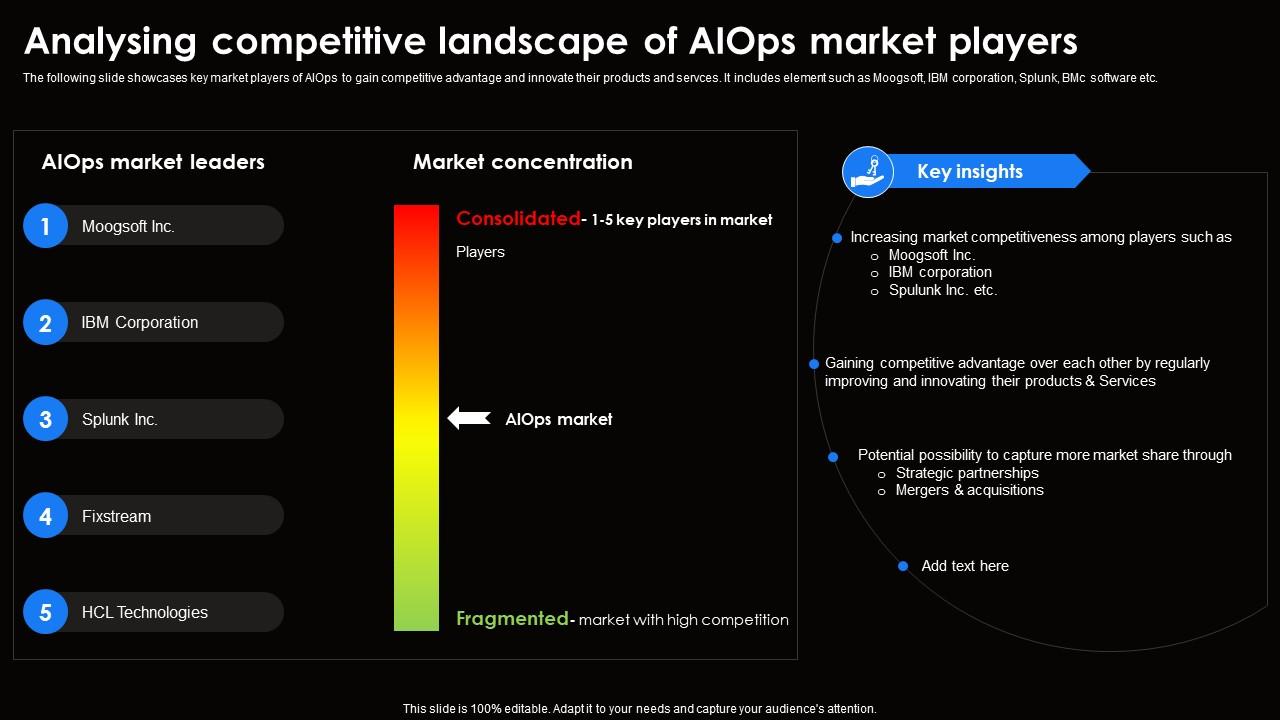Can Google Maintain Momentum In The Competitive AI Landscape? An Investor Perspective

Table of Contents
Google's Current AI Strengths and Market Position
Google boasts a robust AI infrastructure, built on years of research and development. Google Cloud AI, with its powerful computing resources and services like TensorFlow, provides a strong foundation for AI development and deployment. Google also holds significant market share in various AI sectors, particularly in search and cloud computing.
- Market leadership in specific AI applications: Google dominates the search engine market, leveraging AI for search result ranking, ad targeting, and voice search. Its cloud platform also competes fiercely with Amazon Web Services (AWS) and Microsoft Azure in providing AI-powered services to businesses.
- Strengths in research and development: Google's extensive research capabilities and talent pool are undeniable assets. Its publications and contributions to the AI field are widely recognized and respected.
- Weaknesses in consumer-facing AI products: While Google excels in AI infrastructure and enterprise solutions, its consumer-facing AI products haven't achieved the same level of market penetration as some competitors, particularly in the burgeoning generative AI space. This presents a challenge in terms of competitive advantage and market dominance in the broader consumer market. The need to improve the user experience and broaden the appeal of its offerings is crucial for capturing a larger share of the consumer AI market.
Key Competitors and Their Strategies
The AI landscape is increasingly competitive. Several key players pose significant challenges to Google's dominance.
- Microsoft: Microsoft's aggressive integration of AI into its products, particularly through its partnership with OpenAI and the integration of ChatGPT into Bing, represents a major threat. This strategy aims to enhance user experience across its product suite and attract new customers.
- OpenAI: OpenAI's innovative large language models (LLMs), like GPT-3 and GPT-4, have garnered considerable attention and are rapidly transforming various industries. Its technological breakthroughs are pushing the boundaries of what's possible with AI, setting a high bar for competitors like Google.
- Amazon: Amazon leverages its vast data resources and cloud infrastructure (Amazon AI) to provide a comprehensive suite of AI services for businesses, competing directly with Google Cloud AI. Its focus on enterprise solutions provides a strong counterpoint to Google's strategy.
This competitive analysis reveals a fierce battle for market share and technological leadership, forcing Google to adapt and innovate continually to maintain its position. The AI strategy of each of these companies is distinct, showcasing the diversity and rapid evolution of the AI field.
Google's Investment in AI R&D and Future Plans
Google continues to invest heavily in AI research and AI development. This commitment is evident in its ongoing research initiatives, acquisitions, and partnerships.
- Recent acquisitions and partnerships: Google strategically acquires promising AI startups and collaborates with research institutions to expand its capabilities and talent pool.
- Focus areas for future AI development: Google is focusing on several key areas, including improving the efficiency and scalability of its models, enhancing the robustness and safety of AI systems, and developing new applications in healthcare, scientific discovery, and other fields.
- Potential impact on Google's revenue streams: Successful AI innovation is expected to drive revenue growth across Google's various product lines, especially in cloud computing and advertising. This growth potential is a key factor driving continued investment in AI. The future of AI for Google is inextricably linked to its ability to translate these investments into tangible revenue streams.
Risk Assessment for Google's AI Investments
Despite its strengths, Google faces several significant risks in its AI endeavors.
- Regulatory hurdles and ethical concerns: Increasing regulatory scrutiny and ethical concerns surrounding AI development and deployment pose challenges. Ensuring regulatory compliance and addressing ethical dilemmas are crucial for maintaining public trust and avoiding potential legal issues.
- Competition for talent and resources: The intense competition for top AI talent and computing resources presents a significant challenge. Attracting and retaining skilled professionals is vital for maintaining Google's competitive advantage.
- Potential for technological disruption: Rapid technological advancements in the AI field create the potential for disruptive innovations that could render existing technologies obsolete. This necessitates continuous innovation and adaptation to stay ahead of the curve. The inherent investment risk associated with rapid technological change must be carefully considered.
Investor Implications and Recommendations
For investors, understanding Google's AI strategy is crucial for assessing its long-term potential.
- Long-term outlook for Google's AI business: Google's AI business is expected to experience significant growth in the long term, driven by increasing demand for AI-powered services and continued innovation.
- Potential return on investment (ROI) scenarios: The potential ROI for Google AI investments varies depending on several factors, including the success of its new product launches, its ability to navigate competitive pressures, and the overall growth of the AI market.
- Recommendation on whether to invest in Google based on its AI trajectory: While the AI market presents inherent risks, Google's strong existing infrastructure, substantial R&D investments, and significant market share position it favorably. However, the intense competition and regulatory landscape require careful consideration. Investors should diversify their portfolios and conduct thorough due diligence before making investment decisions.
Conclusion: Can Google Maintain Momentum in the Competitive AI Landscape? A Final Verdict for Investors
Google's current position in the AI landscape is a complex picture. While it possesses significant strengths in infrastructure and research, the intense competition from companies like Microsoft and OpenAI, along with regulatory and ethical challenges, presents considerable hurdles. The Google AI future depends on its ability to adapt to this rapidly changing environment and translate its technological advantages into compelling consumer and enterprise products. The long-term investment case hinges on Google's capacity for innovation and its effective management of the risks associated with AI development. The AI market analysis suggests a high-growth but high-risk environment.
For investors seeking exposure to the rapidly evolving AI sector, a thorough assessment of Google's AI strategy is crucial. Understanding the competitive landscape and the inherent risks associated with Google AI investments is critical for making informed decisions.

Featured Posts
-
 Jackson Elk Herd Hunt Deeper Cuts After Public Feedback
May 22, 2025
Jackson Elk Herd Hunt Deeper Cuts After Public Feedback
May 22, 2025 -
 Abn Amro Sterke Stijging Occasionverkopen Door Toenemend Autobezit
May 22, 2025
Abn Amro Sterke Stijging Occasionverkopen Door Toenemend Autobezit
May 22, 2025 -
 Critique Complete Le Matin Auto Conduit L Alfa Romeo Junior 1 2 Turbo Speciale
May 22, 2025
Critique Complete Le Matin Auto Conduit L Alfa Romeo Junior 1 2 Turbo Speciale
May 22, 2025 -
 New Challenger Targets Trans Australia Run World Record
May 22, 2025
New Challenger Targets Trans Australia Run World Record
May 22, 2025 -
 The Viral Reddit Story That Became A Movie Starring Sydney Sweeney A Deep Dive
May 22, 2025
The Viral Reddit Story That Became A Movie Starring Sydney Sweeney A Deep Dive
May 22, 2025
Latest Posts
-
 7 Du An Ket Noi Giao Thong Tp Hcm Long An Nen Uu Tien
May 22, 2025
7 Du An Ket Noi Giao Thong Tp Hcm Long An Nen Uu Tien
May 22, 2025 -
 Phan Tich 7 Vi Tri Ket Noi Tp Hcm Long An Tiem Nang Dau Tu
May 22, 2025
Phan Tich 7 Vi Tri Ket Noi Tp Hcm Long An Tiem Nang Dau Tu
May 22, 2025 -
 Dau Tu Ha Tang Giao Thong 7 Vi Tri Tp Hcm Long An Can Phat Trien
May 22, 2025
Dau Tu Ha Tang Giao Thong 7 Vi Tri Tp Hcm Long An Can Phat Trien
May 22, 2025 -
 Hon 200 Nguoi Chay Bo Dak Lak Phu Yen Mot Trai Nghiem Khong Quen
May 22, 2025
Hon 200 Nguoi Chay Bo Dak Lak Phu Yen Mot Trai Nghiem Khong Quen
May 22, 2025 -
 7 Tuyen Ket Noi Quan Trong Tp Hcm Long An Dau Tu Uu Tien
May 22, 2025
7 Tuyen Ket Noi Quan Trong Tp Hcm Long An Dau Tu Uu Tien
May 22, 2025
